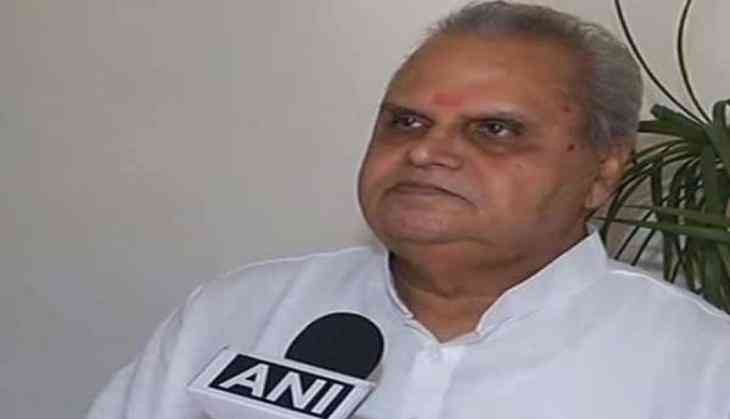
Kashmir’s well known unionist and chief of Democratic Party Nationalist, Ghulam Hassan Mir carries the image of New Delhi’s “tested horse” in the Valley. Lately, he turned up in Srinagar, along with many party delegations to meet the visiting team of Election Commission of India (ECI). After the meeting, Mir made a surprising remark, “There is a strong rumour that Governor Satya Pal Malik (whom he likened with a dictator) doesn’t want to conduct Assembly elections in the state anytime soon.”
The pitch was raised when the regional political parties were already throwing their weight behind the simultaneous elections—Assembly as well as parliamentary—in Jammu and Kashmir, which is currently under President’s Rule.
Coming from Mir, perceived as ‘close to security apparatus’, who in the past was allegedly involved in a conspiracy to remove Omar Abdullah’s government, the remarks have since then created ill notions about the controversial governor’s rule in the state.
“Governor’s rule is an exception,” Mir said. “It can’t replace the popular government.”
A team of ECI was in Srinagar on 4 March to access the ground situation for the upcoming elections.
“I told the team categorically that they might get these inputs from the governor's administration that conditions aren’t conducive for Assembly elections in Jammu and Kashmir at the moment. I think such remarks are aimed at keeping the elected government at bay for some time in the state,” Mir said. “Being an independent institution, ECI must take the decision keeping larger things in view. Jammu and Kashmir needs a popular government and not the one that toys with it.”
Notably, many administrative decisions taken by the governor have already added to the confusion and mistrust among the people in the state. The recent amendment to 1954 constitutional order by the Union Cabinet is a case in point.
“Our state is beset with problems which can only be handled by a popular government,” said National Conference general secretary Ali Mohammad Sagar. “The governor’s rule is an interim arrangement for ensuring sound administration until an elected government is in place.”
Like other regional parties, the NC has been batting for the simultaneous elections in Jammu and Kashmir for a while now.
“The Jammu and Kashmir governor has himself maintained that the recently conducted panchayat elections were peaceful and shorn of any untoward incident,” Sagar said. “The expanse of panchayat elections was much larger than the Parliament and Legislative Assembly elections. There is nothing which suggests irrationally of not having the two elections together.”
Peoples Democratic Party’s senior leader Abdul Rehman Veeri believes that “free and fair” elections will help restore a sense of normalcy in the Valley.
“Unlike governor’s administration, the local representative understands the common man’s problems better,” Veeri said. “And therefore, elections must be held to bridge the gap.”
The regional parties have been pressing for elections since last summer when PDP-BJP coalition government disintegrated in Jammu and Kashmir. They even floated the idea of a grand alliance to end the governor’s rule and to make a claim for government formation last November. But the move was thwarted by Governor Malik who dissolved the Assembly, that too, in a dramatic manner, citing a fax fiasco.
“One of the reasons why these parties are desperate for immediate Assembly elections is to reclaim their lost political relevance in Kashmir,” Zameer Ashai, a local political commentator, said. “After post-2016 situation in Jammu and Kashmir, they were thrown to margins by the governor’s free-hand administration.”
Also, Ashai added, the way these parties faced BJP’s ideological campaign in Kashmir has also made them “to gang up for the polls” now.
Even the law enforcing agencies say Kashmir is “good to go for polls”, despite the routine military-militant clashes.
“But now, everything depends upon the judicial take on Article 35A,” said a senior police officer. “In wake of any adverse decision, there’s every possibility that Kashmir might erupt again.”
And this time, the officer warned, it will be “much more intense given how even cadres of mainstream parties are batting for its status quo.”
Also, in the backdrop of the massive crackdown on Jamaat-e-Islami, many in the mainstream camp expect Malik and his team to work towards making the situation in the state conducive for Assembly elections.
“Now when the boycotters have been sent behind the bars, what better time will this administration get to conduct polls in Kashmir?” asked a senior Congress leader coming from a dominant Jamaat pocket in Kashmir. “If he can conduct urban body and panchayat polls amid frequent protests and encounters, then right now, when things are in better shape, he can easily conduct the polls.”
On Tuesday in the second leg of the two-day tour, the ECI team, headed by Chief Election Commissioner Sunil Arora, reached Jammu where it held discussions with the representatives of various political parties.
It said that almost all political parties in the state have expressed full faith in the ECI and supported holding state Assembly polls simultaneously with the Lok Sabha elections.
“On the issue of need for elections, almost all political parties voiced the need to have both – parliamentary and Assembly elections conducted at the earliest in the state saying that recent turnout in the Panchayat and ULB elections suggests that general population in the state wishes to have their democratically elected government in place,” news agency PTI quoted Chief Election Commissioner Sunil Arora as saying.
“We are mindful of the challenging law and order situation in the state. Theq Commission will look into due security arrangements while deciding on the timing and phasing of the elections,” he said.
All political parties emphasised that due security arrangements be made to provide adequate security to voters and candidates so as to instil confidence in them for a conducive environment for forthcoming elections, he said.


.jpeg)

